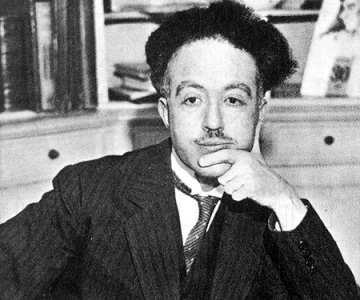|
home | what's new | other sites | contact | about |
||
|
Word Gems exploring self-realization, sacred personhood, and full humanity
Quantum Mechanics
return to "Quantum Mechanics" main-page
Prince Louis-Victor de Broglie (1892 - 1987) Nobel Prize in Physics, 1929, "for his discovery of the wave nature of electrons"
Editor’s note: The French word DeBroglie is pronounced “da-broy.” DeBroglie's hypothesis in 1923 was not overly difficult to understand; in fact, it was too clear, and the physicists of the day didn't like it at all. An excellent teacher of physics explains the issue: Alan Holden (1904 - 1985), Harvard graduate, a physicist and chemist retired from AT&T Bell Labs, produced, in 1962, a clearly-explained documentary presenting the DeBroglie hypothesis, and also the later Davisson-Germer experiment which confirmed it. Holden: “DeBroglie suggested, back in 1923, that particles might behave like waves, and his suggestion grew out of his comparison with the way matter behaves [to] the way light behaves. He wrote that suggestion into a thesis he was submitting for a doctor’s degree to the University of Paris… DeBroglie’s examiners at the University were reluctant to give him a degree for such a fool idea. He got the degree alright but only because Albert Einstein happened to be visiting Paris at the time and said, Look, this isn’t such a bad idea – maybe it’s even true!” here's why this new idea was particularly hard to accept In his thesis, DeBroglie specifically referred to the wave attributes of electrons and, by extrapolation, suggested that all matter might possess these wave properties. The prevailing attitude in 1923 toward electrons was something like this: “Ok, alright, we were taken by surprise by Einstein’s ‘photoelectric effect’, we had to admit that light is a particle (at least sometimes), but we can forgive ourselves for that little mistake because light’s been very mysterious for a long time, but when it comes to the electron, well, we’ve got that one all figured out, and we can’t be wrong this time…
... we know a lot about the electron, we know its mass, its charge, we even know that it leaves a sharp little mark on the screen as a cathode ray, so the electron is definitely matter, it's not a wave, it's a hard little bee-bee, and that’s that." Or not! - as Einstein told the university examiners. what does it mean that matter acts like a wave DeBroglie asked himself the question, “If light is a particle, but, at times, also acts like a wave, well then, could it be possible that other particles also act like a wave?” This is brilliant creativity. He would not confine himself to a narrow little box of certainty, of limiting traditional thinking, but extended what was known, and newly known, into other areas of possibility. This is why Einstein, famously, is on record to have said, "Imagination is more important than knowledge. For knowledge is limited to all we now know and understand, while imagination embraces the entire world, and all there ever will be to know and understand." But what does it mean for matter to act like a wave? This question opens up a vast debate in physics, one that has been fomenting for a hundred years or more. Is light or the electron a wave or a particle? Is it definitely one or the other? Is it both at the same time, a hybrid, as a water-wave is composed of water molecules? Is it one thing for a while but then changes to its alternate? Or does the particle sort of "smear out" merely to appear as a wave? No quick answer can be given right now. However, in my studies of this question, I have encountered the writings and work of physicists who, in my opinion, have credibly answered it, offering explanation that fits all the data. I hope to present this view, step by step, as we proceed in this series.
|
||
|
|
